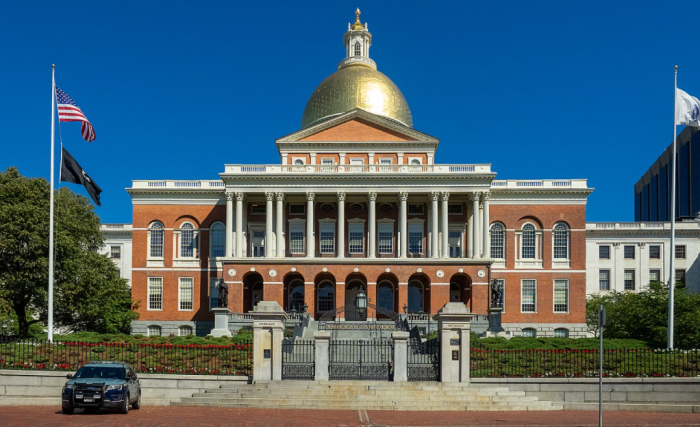Massachusetts establishes constitutional rights to abortion, 'gender-affirming' care
Critics say law turns the state into an 'abortion sanctuary'

Massachusetts Republican Gov. Charlie Baker has signed into law a measure establishing abortion and "gender-affirming care" as constitutional rights, a move pro-life activists contend will turn the state into an "abortion sanctuary."
Baker approved Bill H.4930, "an Act expanding protections for reproductive rights," Friday. The bill's approval follows the U.S. Supreme Court's June 24 ruling in Dobbs v. Jackson Women's Health, which reversed the Roe v. Wade decision that legalized abortion nationwide.
The bill passed in the Democrat-controlled House of Representatives on June 29. The House voted 136-17 to advance the legislation, with 119 Democrats, 16 Republicans and an independent supporting it, while six Democrats and 11 Republicans voted in opposition to the bill. The Senate approved H.4930 in a unanimous vote of 40-0 on July 25.
"Access to reproductive health care services and gender-affirming health care services is recognized and declared to be a right secured by the constitution or laws of the commonwealth," the bill declares. "Interference with this right, whether or not under the color of law, is against the public policy of the commonwealth."
The social conservative advocacy group Massachusetts Family Institute claims the legislation ensures the state will protect "abortionists who perform abortions out-of-state, even if they violate other states' laws." The group contends the bill will lower or eliminate "safety requirements for pharmacies to dispense abortion pills" and "force[s] state universities to provide the abortion pill to students."
The group stresses that the bill will also force insurance companies to cover abortion "even if they have religious objections" and prohibits insurance companies "from charging deductibles or copays for abortions but allows them to do so for all other pregnancy-related services."
"[The bill allows] late-term abortions when a doctor deems a baby 'incompatible with sustained life' outside of the womb, which decision is not subject to review by any medical board," the group stated in a statement.
"This is also an 'intersectional' bill, as its legal protections for abortionists extend to organizations who distribute puberty blockers and cross-sex hormones, even in states where they have been criminalized for use on children. You might not have realized that Planned Parenthood was also in the transgender hormone business, but they are… aggressively so."
Baker signed an executive order on the day of the Dobbs decision proclaiming that the state government agencies may not assist other states seeking to impose civil or criminal liability against anyone who performs an abortion in Massachusetts.
The governor cited concerns that other states would "impose civil or criminal liability or professional sanctions on health care professionals who provide and persons who seek and obtain reproductive health care services in the Commonwealth as permitted by the laws of the Commonwealth."
He maintained that "health care professionals lawfully providing and persons lawfully seeking and obtaining reproductive health services in the Commonwealth should be protected from legal liability premised on and professional sanctions issued under the laws of other States."
"Massachusetts remains steadfast in its commitment to protect access to reproductive health care services, especially in the aftermath of the Supreme Court's decision overturning Roe v. Wade," Baker said in a statement.
"The Court's decision has major consequences for women across the country who live in states with limited access to these services, and our administration took quick action in the hours following that decision by issuing an executive order to protect access here in the Commonwealth," he added. "This new legislation signed today builds on that action by protecting patients and providers from legal interference from more restrictive laws in other states."
H.4930 contains language stating that "no person shall be subject to discipline by the board, including the revocation, suspension or cancellation of the certificate of registration or reprimand, censure or monetary fine, for providing or assisting in the provision of reproductive health care services or gender-affirming health care services."
The enactment of H.4930 occurred in the aftermath of failed efforts to pass the Women's Health Protection Act in U.S. Congress. The bill would codify the right to abortion into federal law and limit the ability of states to implement pro-life laws. The Women's Health Protection Act passed the Democrat-controlled House multiple times, most recently on July 15, three weeks after the Dobbs decision.
However, the bill failed to gain traction in the evenly divided U.S. Senate, where most legislation requires 60 votes to pass. On May 11, 51 of 100 senators voted against invoking cloture, a procedural step that would enable debate to begin on the Women's Health Protection Act. The Senate previously rejected the Women's Health Protection Act in a 48-46 vote on Feb. 28.
Even before Baker signed Bill H.4930 into law, Massachusetts had some of the most permissive abortion laws in the U.S.
In late 2020, the ROE Act became law over Baker's veto. The law codifies the right to an abortion into state law, allows abortions to take place after 24 weeks gestation in the case of a fetal anomaly and permits minors between the ages of 16 and 17 to obtain an abortion without parental consent. The pro-abortion Guttmacher Institute has identified Massachusetts as one of 16 states with laws protecting the right to abortion.
Massachusetts' establishment of a right to "gender-affirming health care" comes after a handful of states have passed laws restricting the ability of minors to obtain puberty blockers and gender transition surgeries.
Alabama, Arizona and Arkansas have implemented such laws while the head of the Texas Department of Family and Protective Services Commissioner Jaime Masters has classified gender transition surgeries for minors as child abuse. The state's Attorney General Ken Paxton issued an advisory opinion saying the same.
Ryan Foley is a reporter for The Christian Post. He can be reached at: ryan.foley@christianpost.com





























